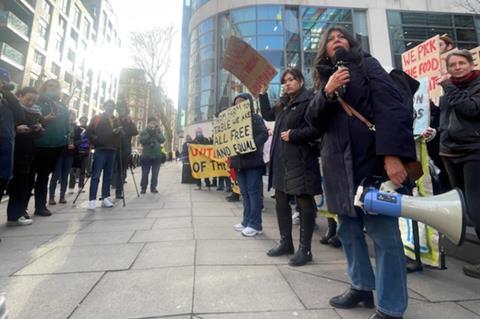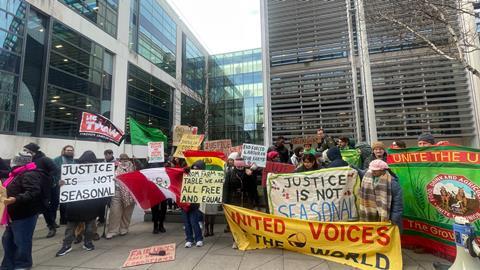Industry stresses vast majority of migrant workers have positive experience and wish to return
Growers’ groups have underlined the UK industry’s efforts to provide safe and positive conditions for seasonal workers against a backdrop of a protest in London.
The trade bodies have pointed to the high levels of satisfaction reported by seasonal workers and the number of people that choose to return from overseas for multiple seasons of work.
It comes as a group of migrant workers held a demonstration on Friday 24 January to demand an end to what they called “exploitation of overseas workers on UK farms”.
The group came to the UK in 2023 as part of the Seasonal Workers Visa Scheme, and held a protest outside the Home Office to highlight their concerns.
Protestors’ asks of government

The demonstrators are asking the UK government to end what they say is “forced labour and exploitation in UK farms” and insisting those responsible be held to account. They are calling for fair wages, safe working conditions, and respect for all workers, as well as “recognition of their modern slavery victim status and access to justice and remediation”.
They argue that there is a body of evidence that seasonal workers in the UK are vulnerable to unfair dismissals, exploitation and high levels of debt as a result of having to pay their own visa, accommodation and travel costs.
The demonstrators have come together under the name ’Justice Is Not Seasonal’ and have been supported by the Landworkers’ Alliance (LWA).
Catherine McAndrew, who coordinates the LWA’s ‘Solidarity with Migrant Landworkers’ campaign and helped organise the demonstration, said: “We are here today to hear from these workers, to hear their experiences, to end the silencing of the people who pick our food, the people who pick our crops. And we are here to deliver a dossier to the Home Office of everything that has happened to them.
“It’s been such an effort to try and tell the Home Office and the authorities about what has happened to these workers. They don’t care. They only care that they make money. They only care that the supermarkets make money. They don’t care about the ‘disposable’ people who work in their fields.”
Industry underlines its efforts
In response to the protest, an NFU spokesperson stressed that overseas workers are invaluable to British farmers and growers in providing food to feed the nation. “The vast majority of workers have a good experience in the UK, which results in many returning to the same farms season after season,” the spokesperson added. “In the latest Defra worker survey, 91 per cent of workers who responded said that they had a positive experience from their time in the UK and 95 per cent expressed a desire to return to work in the UK again.
“Farmers and growers take employee welfare extremely seriously and are continually adapting the way they operate to provide the best experience for workers. We are working with the wider supply chain to further best practice for work experience with the launch of an independent worker survey this spring.”
British Berry Growers chair Nick Marston noted that some 30,000 seasonal workers are employed on British soft-fruit farms every year, and that a significant portion of these return to the same farm in subsequent years. Berry farms also employ around 3,000 permanent workers and support many more jobs indirectly in local communities, he added, making the industry an important contributor to the rural economy.
British Berry Growers also pointed to the Defra survey, pointing out that only 1.6 per cent of respondents stated they would not be looking to return to UK farms.
“As a trade body representing the industry, we expect our farms to treat staff fairly and ethically and ensure there is no risk of labour exploitation,” Marston said. “All British berry farms are regularly audited to ensure that workers, especially those coming from overseas and living on farms, are treated fairly. These audits include assessments to ensure farms comply with the law with respect to employment contracts and actual rates of pay. They also review worker treatment and representation, and standards of accommodation.”




